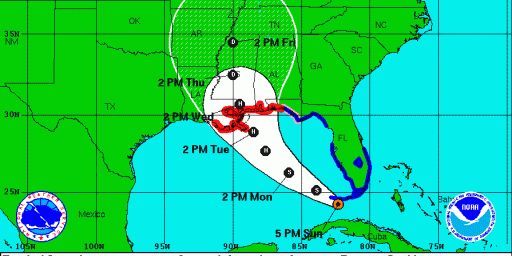There Be Oil Here
Fresh on the heels of a sharp decline in oil and gasoline prices comes news that Chevron and two partners have discovered an oil field apparently containing 3-15 billion barrels of oil in the Gulf of Mexico in U.S. territorial waters off Louisiana:
Oil analysts and company executives said newly released test results from a well 175 miles off the coast of Louisiana indicate that the oil industry will be able to recover well more than 3 billion barrels, and perhaps as much as 15 billion barrels, of oil from a geological area known as the lower tertiary trend, making it the biggest addition to U.S. petroleum reserves in decades. The upper end of the estimate could boost U.S. reserves by 50 percent.
“This looks to be the biggest discovery in the United States in a generation, really since the discovery of Prudhoe Bay 38 years ago,” said Daniel Yergin, chairman of the consulting firm Cambridge Energy Research Associates Inc. “There’s been a lot of anticipation about what’s called the Wilcox formation, and this is the validation of the theory and of the technology,” he said, using another name for the area of the Gulf.
Cambridge Energy forecasts that the deep-water area of the Gulf of Mexico will produce 800,000 barrels of oil a day within seven years and account for 11 percent of U.S. oil production. That would not solve the world’s energy problem or eliminate U.S. reliance on oil imports, but it would help stabilize U.S. oil production, which has been declining, and cover some of the world’s rising demand for petroleum. Prudhoe Bay, in northern Alaska, produced about 1.5 million barrels a day at its peak.
While the oil discovery certainly isn’t the solution to all of America’s energy needs, it may (as economist Stephen Karlson notes) at least provide the opportunity for the U.S. to get more of its energy needs from politically stable sources and reduce the amount of western currency flowing to the regimes of anti-American troublemakers like Hugo Chávez and Mahmoud Ahmadinejad.






Isn’t that track in approximately the same area the china and cuba are drilling?
Thank god for US environmental retards keeping us from reaping the benefits of our geographical homeland, cuz I have no doubt the chinese and cuba will be MUCH MUCH more responsible with the riches of our geological heritage, than we, the US, the most benign nation in the history of the world.
Hmmm. US consumes 5.7 billion barrels a year. There’s 3-15 billion in this field. You do the math.
Also, oil isn’t sold exclusively to the US, rather it’s just part of the global supply. True, the closeness will offset other “local” supplies, but it’s not like this field will be the private tap of the US.
Still, good news from the supply perspective. Doubly so that at least it’s under our territory.
True, it doesn’t alter the global nature of the oil market; however, it would reduce the effectiveness of a boycott or production stoppage. And it’s helpful to have US workers operating this field and the royalty income going into the US treasury (as opposed to Iran’s nuke fund).
I’m not convinced that absolute energy independence is necessary (or even in global economic terms desirable; I don’t think a broke House of Saud would be a particularly fun thing to have around geopolitically), but at least I’d like to see the US getting its oil from more sources here and in allied countries like Canada and Mexico.
Source diversity, folks.
That’s the key.
And this adds to that.
Western currency via China will make them just as happy.